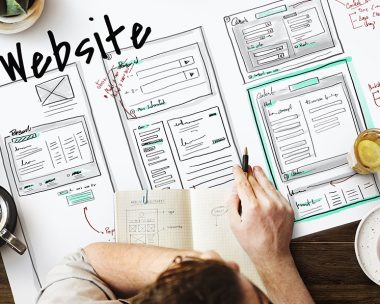Pay-Per-Click How AI Has Revolutionized Google PPC Ads: Key Advantages You Can’t Ignore

Google PPC (Pay-Per-Click) advertising has always been a powerful way to reach targeted customers. But with the arrival of Artificial Intelligence (AI), it’s no longer just powerful—it’s smarter, faster, and more profitable than ever before. If you’re running PPC campaigns today, AI is the game-changer you’ve been waiting for.
1. Smarter Audience Targeting
AI uses real-time data analysis to identify exactly who is most likely to click and convert. Instead of broad targeting, AI can pinpoint micro-audiences based on behavior, location, search history, and even intent signals—ensuring your ads reach the right people at the right time.
Example: AI can detect when a user is searching “best running shoes for marathon” and instantly serve them a tailored ad with your best-selling product.
2. Automated & Data-Driven Bidding
Gone are the days of manual bidding guesswork. AI-powered bidding strategies—like Target CPA (Cost Per Acquisition) or Target ROAS (Return on Ad Spend)—adjust bids in real time based on the likelihood of a conversion. This means less wasted budget and more ROI.
3. AI-Powered Ad Copy & Creative Optimization
AI tools can generate multiple ad copy variations, headlines, and descriptions, then test them automatically to see which performs best. This reduces creative fatigue and ensures your campaigns are always running the highest-converting ads.
4. Enhanced Predictive Analytics
AI can forecast future trends, seasonal demand, and audience behavior before they happen. This predictive power allows you to prepare and allocate your budget more effectively, so you’re always ahead of competitors.
5. Real-Time Performance Optimization
Instead of waiting for weekly reports, AI monitors your campaign performance 24/7. It pauses underperforming ads, reallocates budget to winning ones, and adjusts targeting instantly—maximizing efficiency.
6. Better Fraud Detection
AI algorithms can detect suspicious clicks from bots or fraudulent sources, saving you money by blocking wasted ad spend on non-human traffic.
7. Integration With Voice & Visual Search
AI enables PPC ads to appear in voice search results (“Hey Google, find the best coffee near me”) and visual search queries—opening up entirely new conversion opportunities.
AI hasn’t just improved Google PPC—it has completely transformed it. From smarter targeting to predictive analytics, AI gives advertisers the ability to reach the right audience, at the right time, with the right message—while spending less and earning more. If you’re not using AI in your PPC strategy yet, you’re already behind.
Q1: How has AI changed Google PPC Ads?
AI has made Google PPC Ads more intelligent, automated, and profitable. It enables precise targeting, automated bidding, real-time optimization, and predictive analytics. These features help advertisers reach the right audience, improve conversion rates, and maximize ROI—while reducing wasted budget and saving time on campaign management.
Q2: How does AI improve audience targeting in PPC?
AI analyzes real-time data such as user behavior, location, search history, and intent signals to identify high-value prospects. This ensures ads are shown only to people most likely to click and convert. The result is more relevant ad delivery, higher engagement, and better overall campaign performance.
Q3: Can AI help with bidding in Google Ads?
Yes. AI-powered bidding strategies like Target CPA and Target ROAS automatically adjust bids in real time based on the probability of conversion. This removes manual guesswork, ensures optimal spending, reduces wasted budget, and helps advertisers achieve their performance goals faster and more efficiently.
Q4: Does AI create better ad copy for PPC campaigns?
AI generates multiple ad variations—headlines, descriptions, and calls to action—then tests them automatically to identify the highest performers. This keeps ads fresh, relevant, and engaging while ensuring maximum click-through and conversion rates without the need for constant manual creative updates.
Q5: What is predictive analytics in AI-driven PPC?
Predictive analytics uses AI to forecast future trends, seasonal demand, and audience behavior. Advertisers can use this insight to plan campaigns, adjust budgets, and stay ahead of competitors. By anticipating changes before they happen, brands can capitalize on opportunities and avoid wasted spending.
Q6: How does AI optimize PPC campaigns in real time?
AI monitors campaigns 24/7, automatically pausing underperforming ads, reallocating budget to winning ads, and adjusting targeting instantly. This continuous optimization ensures that every dollar spent is working toward maximum performance—improving conversions, lowering costs, and delivering better overall campaign results.
Q7: Can AI prevent click fraud in Google Ads?
Yes. AI algorithms detect fraudulent activity such as bot clicks or repeated suspicious behavior in real time. Once detected, it blocks these clicks, preventing wasted spend and protecting campaign budgets—ensuring advertisers pay only for genuine, high-quality traffic that has real conversion potential.
Q8: Is AI useful for voice and visual search ads?
Absolutely. AI enables PPC ads to appear in voice search results (“Hey Google, find the best coffee near me”) and visual search queries. This opens new channels for reaching customers who search using voice assistants or image-based tools—expanding campaign reach and conversion opportunities.


